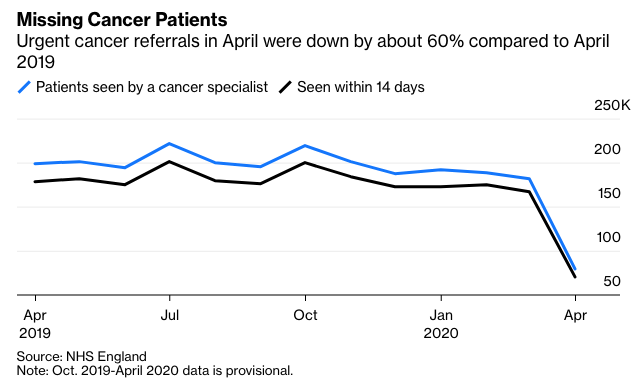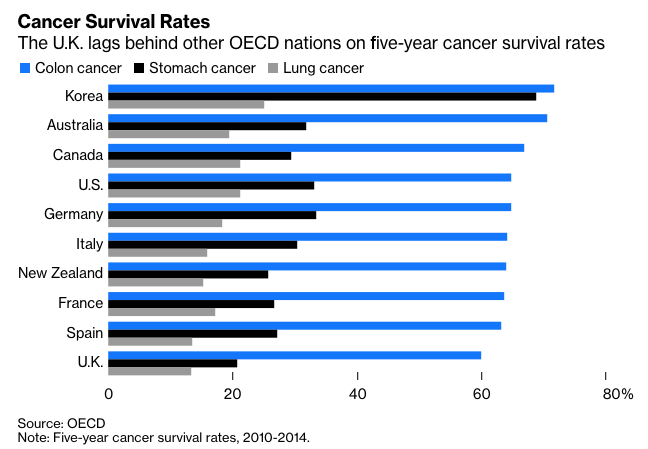It has been a while since I thought back to that week in 2012 when I received news that three close family members had been diagnosed with cancer — two in my household. Newly published figures on how Covid-19 has delayed cancer referrals and treatments brought the memory back. I’m grateful those cases didn’t arise in the middle of a pandemic, but alarmed at the implications for those fighting cancer now.
New data from the U.K.’s National Health Service showed how the focus on Covid-19 has been impacting cancer care. Urgent cancer referrals fell by 60% in April compared with the same month last year. That’s a major concern given how important early diagnosis is to successful treatment and cancer survival rates. This, and other recent data, are a grim reminder that the NHS’s much-lauded response to the pandemic has come at a cost.
How this will affect the U.K.’s already lagging cancer survival rates depends on how quickly the health-care system can restore capacity and deal with a backlog of cases. But the data suggest we had better brace for bad news.
A study published in April modeled the number of excess deaths likely to occur among people with cancer and other problems during Covid-19; the results suggest that an additional 18,000 people with cancer in the U.K. could die in the next 12 months. The researchers also analyzed data from the U.S. and estimated the country could see 33,890 excess deaths from cancer.
At every stage of what is referred to as a patient’s cancer pathway, Covid-19 has slowed things. Even among patients who did get a referral, the proportion who were then seen within the two-week target time was at its lowest level ever in April. The median length of time patients waited for treatment was 12.2 weeks, with more than a million patients waiting more than 18 weeks. There was also an 18% decline in the number of people starting cancer treatment following a referral.

Cancer remains the second biggest cause of death globally (after cardiovascular diseases), and cases are rising in many countries. Despite big improvements in prevention, the number of people diagnosed with cancer each year is set to grow rapidly in the U.K. Cancer Research UK, a charity, estimates that one in two of those born after 1960 will get the disease.
Over the past decade, cancer care has been steadily improving in Britain — albeit from a low baseline. There is now a more ambitious national cancer strategy, better data reporting, more investment and greater public awareness. There are targets for the time between a referral and receiving a diagnostic test (two weeks), receiving a diagnosis (28 days) and starting treatment (no more than 62 days from the date of referral).
Even so, the U.K. lags behind almost all other advanced countries in one- and five-year survival rates for most cancers. Now the pandemic threatens to set back cancer care considerably.









